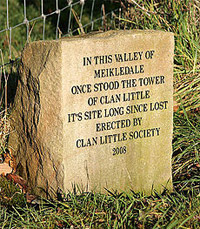Clan Little History
Variations of the surname found in public records are: Litle, Littell, Litill, Littill, Lytil, Lytle, and Lyttille. Little, believed to be a descriptive surname meaning small. Found as Parvus in Latin documents, and Petit in French.
During the reign of William the Lion Hugo Parvus was clericus regis for the King, whilst, possibly the same Hugo Parvus was burgess of Dundee around 1202. An R. Parvus was a chaplain who, between 1214-1240, was witness to a charter that was in favour of the Hospital of Soltre.
A Martin Litill who was witness to a charter by William, dominus vallis de Ledell for the lands of Abirdowyr in Fife in 1351, is believed to be the same Martin Lytill, who in 1358, owned the lands of Cardyvn. In 1426, Duncan Petit was the chancellor of the church of Aberdeen, and Johannes Petit, also seen as J. Litill, was vicar of Lestalrig in 1448.
Lands at Meikledale, Kirkton and Sorbie were held by the Littles. By becoming one of the notorious rinding clans, attacking and plundering places on both sides of the border, the family was quick to make their presence felt in the area. By the end of the 16th century, they had earned a reputation as the best light cavalry in Europe. James VI forcefully and aggressively put an end to the border raids, which had been going on since the late 12th century, not long after he took over the English throne. Many border clans, including the Littles, fled south into England, or across to Ulster, becoming the people known as Ulster-Scots.
The clan currently are an armigerous clan, having no chief, and have not had one since the 17th century.
DNA sampling has recently disclosed ancestral relationships between those with the names of Glendinning, Little and Elliot. The 17th century historian, Scott of Satchells, described a transplantation from Angus to the Borders of “twelve great families.” The Elliots of Redheugh were the predominant family, and their Breton origin has now been well established. Historians have found that Anglo-Bretons and therefore Scots-Bretons, were notoriously late in adopting surnames. In the case of the Elliots, the adopted surname, “Elwald” was used interchangeably with the old Breton toponym-based surname, and eventually abandoned. This DNA sampling now suggests that those families which were not settled on Redheugh lands adopted their own new surnames, based on local toponymic or geographic features, as the Flemish Douglas progenitor had done, taking his name from lands surrounding Douglas Water. The Glendinnings took their name from their new home, and the Littles took their name from the Liddel. The close connection between the Douglases, the Elliots, Glendinnings and Littles makes these DNA results especially significant. The Breton origin of the progenitor of the Stewarts, Walter fitzAlan (of Dol, Brittany), has always been known, but now we can at last identify more Scots of Breton origin, whose settlement in Scotland, like that of so many feudatories of Norman, Flemish and Picard origin during the reign of William the Lion, has been described by one distinguished historian as a “tidal wave. William especially favoured Flemings like Freskin (Clan Murray) and his nephew Theobald, founder of the powerful Douglas family, and Beorwald, founder of Clan Innes. Most mercenaries or professional soldiers of this period were either Flemish or Breton, given land instead of pay by a cash-strapped William I.
Clan Little Posts







